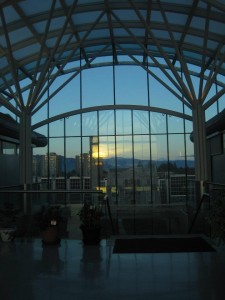In my previous post, I talked about going on a tour in a local hospital led by two medical residents (Ken and Jeff) and put together by an undergraduate club at UBC. I explained my interest in a career as a physician and then briefly mentioned the themes of structure, agency, and autonomy, using an example from the tour. In this blog post, I would like to write about the process to an established career in medicine in relations to two of the aforementioned themes: structure and agency and using my favourite reading (The Sociological Imagination) from our seminar this semester to analyze my thoughts.
 Photo: midwifery.ubc.ca
Photo: midwifery.ubc.ca
Working 70-80hrs/week
A recurrent topic that both Ken and Jeff brought up was having 70-80 hour work weeks. As residents they work 70-80 hours per week with a possibility of having additional hour devoted to research work which may add up to a 100-hr work week. As a response, I tried to challenge them with the question, “How do you keep yourself healthy while trying to keep others healthy?” It just didn’t make sense to me that the job of medical residents and doctors is to keep people healthy and cure patients, but while they’re doing that, they’re asked to work 70-80 hour weeks, to work on-call, to work overnight, to do all-nighters, to skimp on sleep….. In response, Jeff described to us times that he would not have worked-out (exercised) for months and that he hasn’t cooked his own food in three months. He told us that it is important to be adaptable because this is just something that you “adapt to.” He then dubbed this work-life style an “old system.”
Relocating to rural areas to work
Jeff talked to us about his desire to work in the northern areas of BC, such as Kamloops, after he completes his residency. My question, of course, was “why?” From what I heard, his biggest reason for working in the interior is for the work variety and calmer lifestyle that it would provide. Whereas in a big hospital in the metropolitan areas there are different doctors working in different units, instead, working in the rural areas would mean that one doctor could be moving across all units and following all the patients. He also mentioned that there are “more things you can do” and “it’s easier to do things.” By that, I think he meant that the system is less bureaucratic and more flexible, hence easier to navigate, work around, and to do things.
Working in a big hospital
Ken on the other hand, gives off a more ambitious and driven sense of character, and is firm about working in big hospitals. His two main reasons for doing so are: (1) he wants to deal with kids who are super sick (these residents are pediatricians) and (2) he is really keen on the academic side of things and doing research — big hospitals and big cities would have the resources to assist him with grant-writing and open up to him a network of people relevant to his research work.
Tips for Applying to Medical School
A big question that we had as a group was about the process of applying to medical school. On this topic, Jeff and Ken had similar insights. Both of them agreed that you need to “jump hoops” and “play the game.” They say that the admissions process is to find the right people. Here are a list of inspiring messages I got from them:
- be honest, genuine, and straight-forward
- don’t contrive / blow-up or magnify your work and/or accomplishments
- “If you’re in it [going to medical school] for the right reasons, it’ll show [in your interviews]”
- be excited
- be yourself!
Jeff also told us about how we wasn’t like most of the other medical students who were overachievers to begin with. However, after being in medical school he started following the “culture” and tried to do many things too – trying to “find his place in the world,” but he ultimately burn out. With that, he leaves us with some life advice:
–-> “Don’t sacrifice your happiness for your future”
 Photo: newcw.phsa.ca
Photo: newcw.phsa.ca
This reflection makes me think about a quote from C. Wright Mills: “The first fruit of this imagination – and the first lesson of the social science that embodies it – is the idea that the individual can understand her own experience and gauge her own fate only by locating herself within her period, that she can know her own chances in life only by becoming aware of those of all individuals in her circumstances”
Throughout the three four examples I gave above, I see strong interlinks between structure and agency. In the quote above and in Mill’s (1959) The Sociological Imagination, he discusses how people are living and making choices under the influence of the current time period and organizational structures. Working 70-80 hour weeks – is it really a choice? Relocating to rural areas – is it really a choice? Working in a big hospital – is it really a choice? Or are these “semi-choices” or “choices under circumstances” Why must we “jump through hoops” and “play the game” in order to get into medical school? What are these “hoops”? What is this “game”? These are all questions that, I pose to the reader, you – to think about, discuss, and answer.
And the question for myself – who am I, this person who wants to do what to get where [medical school, a career in medicine]?
Reference: Mills, C. W. (1959). The sociological imagination. Oxford University Press.
